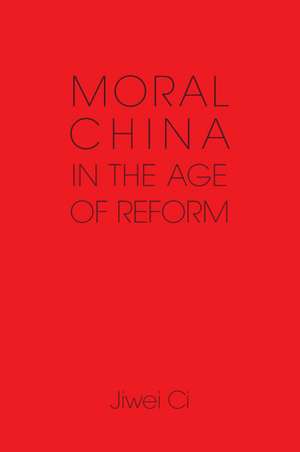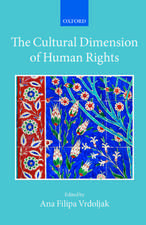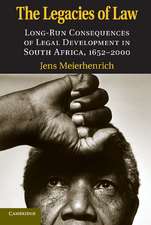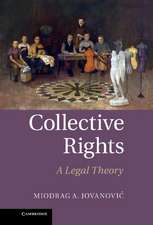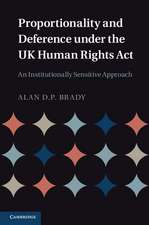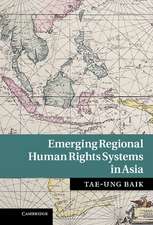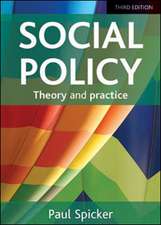Moral China in the Age of Reform
Autor Jiwei Cien Limba Engleză Paperback – 10 aug 2014
| Toate formatele și edițiile | Preț | Express |
|---|---|---|
| Paperback (1) | 202.52 lei 6-8 săpt. | |
| Cambridge University Press – 10 aug 2014 | 202.52 lei 6-8 săpt. | |
| Hardback (1) | 691.66 lei 6-8 săpt. | |
| Cambridge University Press – 10 aug 2014 | 691.66 lei 6-8 săpt. |
Preț: 202.52 lei
Nou
Puncte Express: 304
Preț estimativ în valută:
38.75€ • 41.44$ • 32.31£
38.75€ • 41.44$ • 32.31£
Carte tipărită la comandă
Livrare economică 17 aprilie-01 mai
Preluare comenzi: 021 569.72.76
Specificații
ISBN-13: 9781107646315
ISBN-10: 1107646316
Pagini: 244
Dimensiuni: 151 x 228 x 12 mm
Greutate: 0.34 kg
Ediția:New.
Editura: Cambridge University Press
Colecția Cambridge University Press
Locul publicării:New York, United States
ISBN-10: 1107646316
Pagini: 244
Dimensiuni: 151 x 228 x 12 mm
Greutate: 0.34 kg
Ediția:New.
Editura: Cambridge University Press
Colecția Cambridge University Press
Locul publicării:New York, United States
Cuprins
Introduction: why the question of freedom is unavoidable; 1. An anatomy of the moral crisis; 2. Political order, moral disorder; 3. Freedom as a Chinese question; 4. Freedom and its epistemological conditions; 5. Freedom and identification; 6. Neither devotion nor introjection; 7. The insult of poverty; 8. Democracy as unmistakable reality and uncertain prospect; 9. Freedom's unfinished task; 10. China's space of moral possibilities.
Recenzii
'Jiwei Ci's remarkable book presents a gripping picture of contemporary China's moral chaos and political vulnerability. He offers a deep diagnosis of the sources and character of China's increasingly obtrusive and painfully felt moral crisis and makes clear how desperately difficult that crisis will be to resolve. He places residual hope in the imaginative resources of China's ancient commitment to a very concrete conception of the good and in the possible political commitment of the ruling party to revive some viable interpretation of that ancient commitment's implications, which together level a bracing challenge to assess China's political plasticity.' John Dunn, University of Cambridge
'Jiwei Ci accomplishes two things in his splendid new book. First, he goes beyond the account of his seminal Dialectic of the Chinese Revolution (1994) to explore the causes and effects of the moral crisis that has accompanied China's three decades of post-Mao reform. Second, he uses this analysis as the foundation for theories of freedom and human agency - theories that are deeply revealing not just of the possibilities and challenges faced by Chinese citizens, but also of the human condition more generally.' Stephen C. Angle, Wesleyan University
'Writing in an elegant and persuasive style, Ci artfully connects China's moral crisis with perennial questions regarding freedom, which are profoundly addressed from the perspectives of general philosophy and ethics. The outcome is a superb piece of work that should not be missed by not only scholars of China or Asia but also scholars of ethical and political philosophy, who will find it substantively helpful, as well.' Xingzhong Yu, Anthony W. and Lulu C. Wang Professor in Chinese Law, Cornell University Law School
'This thought-provoking volume by Ci seeks to examine the moral crisis in post-Mao China by treating it as a mirror of the deep contradictions created in the subject as well as in society … The author suggests that the positive future of China depends … on full cognizance of what it means to live under modern conditions of liberty, and such cognizance involves both acceptance of liberty as constitutive of modern life and awareness of its moral and political liabilities in the absence of a dialectical relation with the good … Summing up: recommended.' S. K. Ma, Choice
'Jiwei Ci accomplishes two things in his splendid new book. First, he goes beyond the account of his seminal Dialectic of the Chinese Revolution (1994) to explore the causes and effects of the moral crisis that has accompanied China's three decades of post-Mao reform. Second, he uses this analysis as the foundation for theories of freedom and human agency - theories that are deeply revealing not just of the possibilities and challenges faced by Chinese citizens, but also of the human condition more generally.' Stephen C. Angle, Wesleyan University
'Writing in an elegant and persuasive style, Ci artfully connects China's moral crisis with perennial questions regarding freedom, which are profoundly addressed from the perspectives of general philosophy and ethics. The outcome is a superb piece of work that should not be missed by not only scholars of China or Asia but also scholars of ethical and political philosophy, who will find it substantively helpful, as well.' Xingzhong Yu, Anthony W. and Lulu C. Wang Professor in Chinese Law, Cornell University Law School
'This thought-provoking volume by Ci seeks to examine the moral crisis in post-Mao China by treating it as a mirror of the deep contradictions created in the subject as well as in society … The author suggests that the positive future of China depends … on full cognizance of what it means to live under modern conditions of liberty, and such cognizance involves both acceptance of liberty as constitutive of modern life and awareness of its moral and political liabilities in the absence of a dialectical relation with the good … Summing up: recommended.' S. K. Ma, Choice
Notă biografică
Descriere
This book is a study of post-Mao Chinese moral subjectivity and a philosophical inquiry into the relation between moral subjectivity and freedom.
